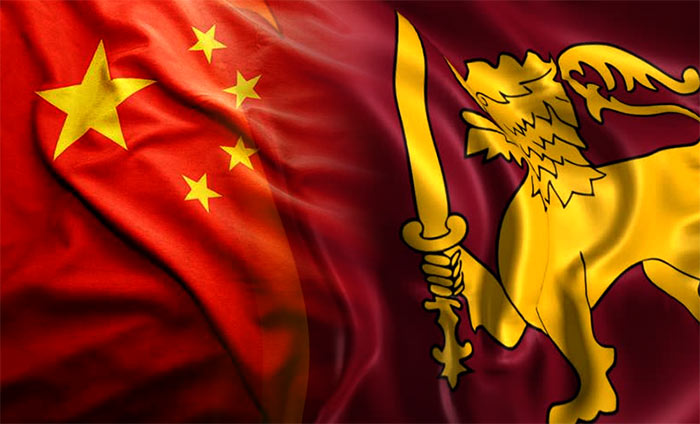Sri Lanka’s weak regulatory frameworks led to China debt burden: Report

Sri Lanka’s weak regulatory frameworks and weak circumspection exercised by politicians and public officials alike in making decisions have led to the island nation’s China debt burden, says a new report.
Part of the blame goes to China and its lending practices says Verite Research, a private think-tank, which has brought out a report, “The Lure of Chinese Loans: Sri Lanka’s experiment with a special framework to finance its infrastructure.”
The report sheds light on the perils of deviation from competitive bidding to tap into concessional export credit offered by China.
Its advice: three Nos – no irresponsible borrowing, no cost overruns, and no poor project selection.
It makes out a strong case for improving independent oversight of the procurement process.
Sri Lanka does not have a statutory procurement law.
More than a decade ago, in 2010, during the Rajapaksa regime, a framework was put in place to approve unsolicited project proposals, which, in essence, was a goodbye to the normal competitive bidding process.
This paved the way for tapping concessional Chinese credit to finance ambitious infrastructure development plan.
The period of 2010-2016 became the golden era with China lending $ 5,895 million. Over half of these loans (53%) were realised through projects approved on the recommendation of a Cabinet Committee.
Analysing the design and execution of projects thus cleared, the Verite Research says, the evaluation process lacked vigour. It was also highly prone to abuse and misuse with the decision-makers exercising excessive discretion.
The report highlights the flip side of a water supply project.
The proposal for the Gampaha, Attanagalla, and Minuwangoda Water Supply Project (GAMWS) came from China Machinery Engineering Corporation (CMEC). And it was given the work order though the company had “little experience and expertise” in executing such water projects.
The contract was awarded without carrying out the minimum due diligence required.
The feasibility study and environmental impact assessments for the project were completed after the contract was signed.
The contract price was 33.4% higher than the estimate of $ 172 million. Yet, the Government failed to secure the concessional export credit facility. Three years after signing the contract, it had to settle for a less concessional loan from the China Development Bank.
Delays in securing funding with investigations into alleged malpractices delayed project completion by more than seven years.
The report also highlighted inadequacies in the oversight processes to detect and prevent malpractices.
The Chinese government cultivated the Rajapaksa family with expensive vanity projects like an International Airport (near Hambantota, where the Chinese have built a port).
A Chinese bank funded the airport venture at a high interest rate. Like the Hambantota port, the airport has become a white elephant. ###
-
Book Shelf
-
 Book Review
DESTINY OF A DYSFUNCTIONAL NUCLEAR STATE
Book Review
DESTINY OF A DYSFUNCTIONAL NUCLEAR STATE
- Book ReviewChina FO Presser Where is the fountainhead of jihad?
- Book ReviewNews Pak Syndrome bedevils Indo-Bangla ties
- Book Review Understanding Vedic Equality….: Book Review
- Book Review Buddhism Made Easy: Book Review
- Book ReviewNews Elegant Summary Of Krishnamurti’s teachings
- Book Review Review: Perspectives: The Timeless Way of Wisdom
- Book ReviewNews Rituals too a world of Rhythm
- Book Review Marx After Marxism
- Book Review John Updike’s Terrorist – a review
-
-
Recent Top Post
-
 NewsTop Story
What Would “Total Victory” Mean in Gaza?
NewsTop Story
What Would “Total Victory” Mean in Gaza?
-
 CommentariesTop Story
The Occupation of Territory in War
CommentariesTop Story
The Occupation of Territory in War
-
 CommentariesTop Story
Pakistan: Infighting in ruling elite intensifies following shock election result
CommentariesTop Story
Pakistan: Infighting in ruling elite intensifies following shock election result
-
 CommentariesTop Story
Proforma Polls in Pakistan Today
CommentariesTop Story
Proforma Polls in Pakistan Today
-
 CommentariesTop Story
Global South Dithering Away from BRI
CommentariesTop Story
Global South Dithering Away from BRI
-
 News
Meherabad beckons….
News
Meherabad beckons….
-
 CommentariesTop Story
Hong Kong court liquidates failed Chinese property giant
CommentariesTop Story
Hong Kong court liquidates failed Chinese property giant
-
 CommentariesTop Story
China’s stock market fall sounds alarm bells
CommentariesTop Story
China’s stock market fall sounds alarm bells
-
 Commentaries
Middle East: Opportunity for the US
Commentaries
Middle East: Opportunity for the US
-
 Commentaries
India – Maldives Relations Nosedive
Commentaries
India – Maldives Relations Nosedive
-
AdSense code



















